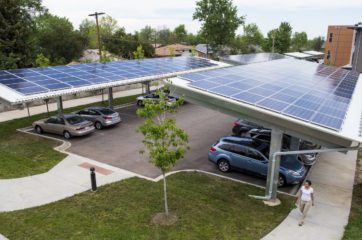Last week, a county judge in Oregon ruled that the rejection by Secretary of State Bev Clarno of two ballot initiatives aiming to reduce greenhouse gas emissions was improper. The initiatives will now continue through the process that will place them on the ballot in November, giving voters the ultimate decision on the legally binding measures.
In December, Clarno questioned their legitimacy, stating that they dealt with more than one subject, which is illegal under Oregon law. Circuit Court Judge David Leith found this was not the case, and that both initiatives meet constitutional requirements.
These ballot initiatives are seen as a backstop to ensure climate action happens this year in Oregon, as there have been difficulties in passing bills through the state legislature in the past due to fierce Republican opposition.
What do the initiatives do?
Initiative 48 and 49 are the product of The Oregonians for Clean Air coalition, a combination of some of the leading climate advocates in Oregon, including Renew Oregon, the NAACP, and NARAL. While only one of them is expected to make it on the November ballot, three were proposed.
Initiative 48 requires that 100% of electricity sales derive from clean, carbon-free sources by 2045. This expands upon the current law, which requires that 50% of energy produced by large electric utilities be renewable by 2040, raising ambition. It also ensures that construction projects that comply with the initiative follow fair labor practices.
The second, Initiative 49, similarly requires that 100% of electricity produced in the state be carbon-free by 2045, that the energy industry immediately begins to phase in clean energy, and that fair labor standards are followed in compliant projects. Initiative 49 differs from 48 because it also requires electric utilities to invest in measures to reduce greenhouse gas emissions, ensuring that consumers benefit from the transition to renewables.
Clarno’s lawsuit
Clarno has opposed the ballot initiatives since their introduction, arguing that they were too broad and included multiple subjects because of their incorporation of labor standards. Attorney General Ellen Rosenblum failed to agree with Secretary Clarno and refused to back her in court, which prompted Clarno to pay for very expensive private lawyers to pursue her lawsuit.
This is not the first time Secretary of State Bev Clarno has disagreed with the Attorney General. In early 2019, Clarno rejected three proposed initiatives to protect water sources in forests throughout Oregon, which Rosenblum supported. Although a judge found Clarno correct in rejecting the initiatives last April, these are currently under appeal.
Environmentalists have seen these decisions by Clarno as “a pattern of flagrant abuse of power by this secretary of state, far outside the norms for any Democrat or Republican who has held the office,” according to Tera Hurst, executive director of Renew Oregon, who also served as one of the plaintiffs during the ballot initiative case.
The legal approval of ballot initiatives 48 and 49 is a huge step forward in pushing past Clarno’s objections, which have prohibited climate policy from moving forward at the ballot initiative level.
Moving ahead in Oregon
Now that these ballot initiatives have been approved by the courts, it is clear that Oregon will be pushing ahead with environmental policy in 2020.
“The judge’s ruling clears the way for strong climate action in Oregon this year, one way or another — whether at the ballot, in the legislature, with executive power, or some combination of all of them,” says Hurst.
These ballot initiatives come in tandem with new legislation that will be offered this session, Legislative Concept 19. This bill is very similar to House Bill 2020, which failed to pass last year when House Republicans fled the state during the vote.
There are some alterations to the cap-and-invest legislation this year, which Democratic lawmakers hope will bring rural and business stakeholders on board. Changes include a staggered implementation of automobile fuel regulations, which aim to address rural concerns about gas hikes. Joining the fuel regulations is voluntary for rural counties, although there is a high incentive to participate — 80% of fuel emissions credits go back to the community that pay for them in the form of direct rebates. This legislation will be formally introduced to the legislature when the session begins on February 3rd this year.
Governor Kate Brown also views cap-and-invest to be priority legislation. She has been a huge advocate for proposed bills in the past, and will certainly support Legislative Concept 19 during the upcoming session. Gov. Brown began exploring climate action at the executive level after the difficulties in passing legislation last session, and will continue to do so this year.
Between the ballot initiatives, Legislative Concept 19, and Governor Kate Brown’s firm stance on passing aggressive climate policy, lawmakers are very hopeful that 2020 will be a big year for climate action in Oregon.










